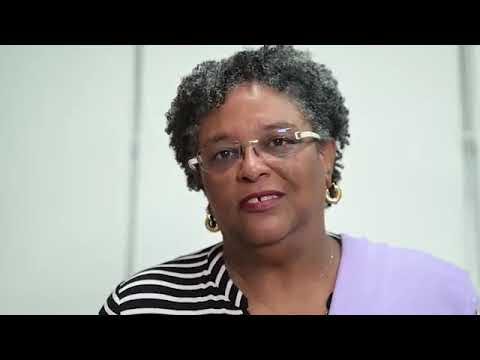🔅 From Slave Plantation Payouts to Deadly Floods
Barbados' Reparations Debate, Namibia's Oil Boom, and Burkina Faso's Civilian Massacre.
Photo of the Day

Spotlight Stories
Barbados PM Halts Multi-Million-Pound Payout to British MP for Slave Plantation Purchase
Barbados Prime Minister Mia Mottley has put the brakes on a plan to pay British Conservative MP Richard Drax millions of pounds for the purchase of 53 acres of his family's former sugar plantation, Drax Hall. The decision comes after the payout plan sparked outrage among those involved in the Caribbean reparations movement, who argued that Drax should instead hand over all or part of the 617-acre plantation to the people of Barbados as a form of reparations.
In a YouTube broadcast to the nation, Mottley explained the government's U-turn, saying she had decided to pause the purchase to allow for further discussion. She acknowledged the concerns of many Barbadians who felt they had been "robbed of the opportunity of having an appropriate settlement for reparations" due to the centuries of exploitation and enslavement their ancestors endured.
Trevor Prescod, a Barbadian MP and lead for reparations on the island, believes that Barbados "should not pay a cent for Drax Hall." He welcomed Mottley's announcement but expressed concern over the use of the word "pause."
Drax, who is worth more than £150m, inherited the plantation in 2017 from his late father.
The Drax family built the sugar plantation in the mid-17th century and operated it with enslaved people for 200 years, even receiving compensation after the abolition of slavery in 1834.
Sir Hilary Beckles, who is from Barbados and chairs the Caricom Reparations Commission, a Caribbean-wide body, has described Drax Hall as “a crime scene”, a place where, he estimates, 30,000 Africans died in slavery.
The 53-acre site has been selected for the development of 500 lower- and middle-priced houses as part of Mottley's pledge to build 10,000 homes to meet demand on the island.
Galp Strikes Black Gold in Namibia: 10 Billion Barrels and Counting

Portuguese oil company Galp Energia has hit the jackpot off the coast of Namibia, and they're not just talking about a few measly barrels. After conducting testing operations at the Mopane-1X and Mopane-2X wells, Galp estimates that the Mopane field could have at least 10 billion barrels of oil.
The Mopane field, located in the Orange Basin along the southern African coast, is in good company. Shell and France's TotalEnergies have already made several oil and gas discoveries in the area, but Galp's find might just take the cake.
During the tests, flows reached the maximum allowed limit of 14,000 barrels per day.
It's not just Galp that's excited about Namibia's oil prospects. The OPEC+ oil producers group, which has lost Angola and other players in recent years, is eyeing Namibia for possible membership. With the potential to become Africa's fourth-largest oil output by the next decade, Namibia's potential appears limitless right now.
Nairobi Submerged: Extreme Flooding Overwhelms Kenya's Capital

It's raining cats and dogs in Kenya, and not in a cute way. The heavy downpour has turned roads into rivers in Nairobi, causing widespread devastation and forcing more than 40,000 people from their homes.
Online, footage can be seen of entire neighbourhoods underwater, with residents trapped on their rooftops.

The residents of the Mathare slum had it particularly rough, being forced to sleep on rooftops overnight. Major highways have been submerged, causing traffic jams across the country.
The flooding isn't just limited to Kenya:
Nearly 100,000 people have been displaced in Burundi and at least 58 people dead in Tanzania.
Experts say that one of the biggest drivers of heavy rain in East Africa is the Indian Ocean Dipole, often called the "Indian Niño" because of its similarity to its Pacific equivalent. When both a positive IOD and an El Niño occur at the same time, as was the case last year, the rains in East Africa can become extreme, causing severe flooding and thousands of deaths.
Burkina Faso's Military Accused of Massacring Over 220 Civilians in a Single Day
Human Rights Watch (HRW) has reported that Burkina Faso's military massacred more than 220 civilians, including at least 56 children, in a single day this year. The mass killings, which HRW termed "among the worst army abuse" incidents in the country in nearly a decade, took place on 25 February in the villages of Soro and Nondin.
According to survivor accounts, a military convoy with over 100 soldiers descended on Nondin village, went door-to-door ejecting residents from their homes, and then rounded up villagers in groups before opening fire on them. An hour later, they arrived in Soro, about 5km away, and repeated the same actions.
The mass killings are believed to be retaliation by the military, which accused the villagers of aiding armed Islamist fighters following an attack on a nearby military camp. A survivor reported that before the shootings, the soldiers accused the residents of failing to cooperate with them by not informing them of the movements of the Islamist fighters.
The Burkinabè authorities have not yet commented on the HRW report, but public prosecutor Aly Benjamin Coulibaly had previously appealed for witnesses to identify the group behind the mass killings, putting the preliminary death toll at 170.
Food for Thought
“Even the lion, the king of the forest, protects himself against flies."
— Ghanaian Proverb






